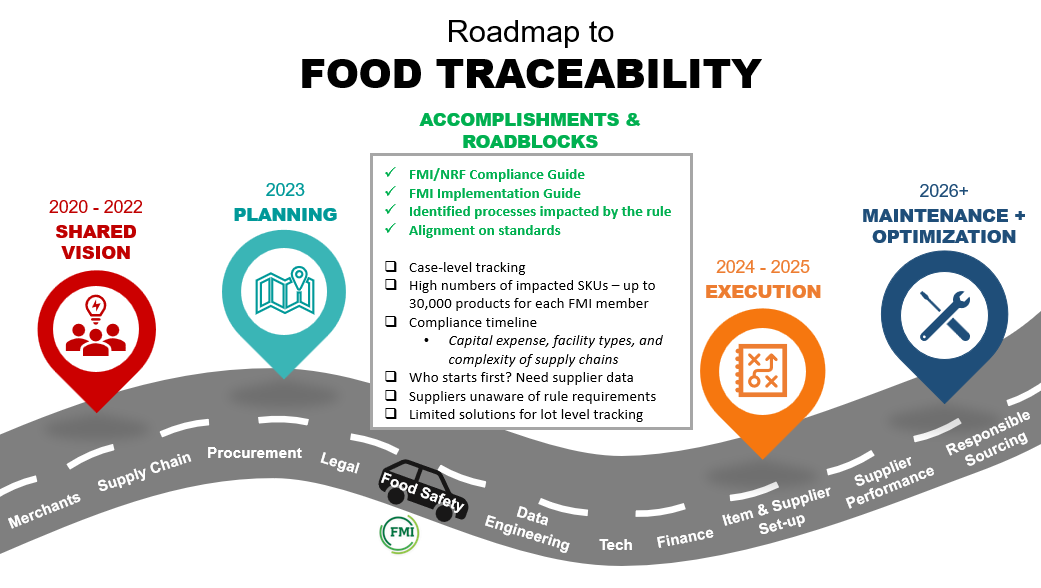By: Jennifer Hatcher, Chief Public Policy Officer, Food Marketing Institute
 As the lead shopper in my household, I appreciate all the ways food retailers communicate to deliver value to their customers. Caveat: As the Chief Public Policy Officer at FMI, my lens is hyper-focused on the details of the laws and rules thanks to my role. I’ve worked with our food retail and wholesale members on a gamut of labeling issues – from nutrition facts to Facts Up Front to bioengineering – but no issue has been more confusing for food retailers than menu labeling, a regulation originally designed for the chain restaurant industry.
As the lead shopper in my household, I appreciate all the ways food retailers communicate to deliver value to their customers. Caveat: As the Chief Public Policy Officer at FMI, my lens is hyper-focused on the details of the laws and rules thanks to my role. I’ve worked with our food retail and wholesale members on a gamut of labeling issues – from nutrition facts to Facts Up Front to bioengineering – but no issue has been more confusing for food retailers than menu labeling, a regulation originally designed for the chain restaurant industry.
Food retailers want nothing more than to provide their customers with the nutritional information they want in order to make choices for their health and their families. Consequently, grocers want to implement these rules in the most consistent, effective and efficient manner, as evidenced by our work to develop the Menu Labeling Implementation Guide . For several years, FMI has been seeking some flexibility and clarity under FDA’s “menu labeling” rule, so supermarkets can implement and provide calorie and other nutritional information that makes sense for the types of foods they offer and the customers they serve.
The supermarket industry has already invested millions of dollars to implement the regulations, and provide the information in the best format for customers to be fully compliant, but significant concerns remain that require Congressional action.
Even with a May 2018 compliance deadline and our members' diligent efforts to communicate calorie information to their customers, we continue to seek clarity on how food retailers (with 20 or more locations that do business under the same name and sell substantially the same restaurant-type foods items) implement this law when there are still major concerns about what compliance and enforcement will look like. For example, the guidance does not include the formal enforcement protections for good-faith compliance efforts, it does not definitively provide for a centrally located, prominent menu board for salad bars and other food displays, and hinders the ability for retailers to sell locally made and locally sourced foods.
Food retailers must have liability and enforcement protections to provide certainty after having spent millions of dollars and thousands of hours to implement the regulations in their stores. The enforcement protections in the Common Sense Nutrition Disclosure Act provide for a 90-day corrective period if an inspector identifies something that is out of compliance. The liability protections maintain the federal and state’s ability to inspect, enforce and bring action but protect against private right-of-actions.
Please ask your Members of Congress to Support the Common Sense Nutrition Disclosure Act on the House Floor. Send your letter here or visit http://foodaction.net.


 Industry Topics address your specific area of expertise with resources, reports, events and more.
Industry Topics address your specific area of expertise with resources, reports, events and more.
 Our Research covers consumer behavior and retail operation benchmarks so you can make informed business decisions.
Our Research covers consumer behavior and retail operation benchmarks so you can make informed business decisions.
 Events and Education including online and in-person help you advance your food retail career.
Events and Education including online and in-person help you advance your food retail career.
 Food Safety training, resources and guidance that help you create a company food safety culture.
Food Safety training, resources and guidance that help you create a company food safety culture.
 Government Affairs work — federal and state — on the latest food industry policy, regulatory and legislative issues.
Government Affairs work — federal and state — on the latest food industry policy, regulatory and legislative issues.
 Get Involved. From industry awards to newsletters and committees, these resources help you take advantage of your membership.
Get Involved. From industry awards to newsletters and committees, these resources help you take advantage of your membership.
 Best practices, guidance documents, infographics, signage and more for the food industry on the COVID-19 pandemic.
Best practices, guidance documents, infographics, signage and more for the food industry on the COVID-19 pandemic.
